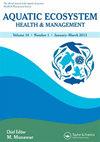Dynamics of dissolved organic phosphorus in the nearshore of eastern Lake Erie
IF 0.8
4区 环境科学与生态学
Q4 ENVIRONMENTAL SCIENCES
引用次数: 0
Abstract
The east basin of Lake Erie continues to suffer from blooms of filamentous green algae (primarily Cladophora). Potential management action through reduced phosphorus loadings have and continue to focus on the dissolved inorganic phosphorus pool but other potentially bioavailable phosphorus pools are not always considered. In this study, we describe the dissolved organic phosphorus pool in eastern Lake Erie, with an extensive sampling of four transects along the north shore of the eastern basin from May to September 2019. The dissolved organic phosphorus pool was characterized and quantified using sequential enzymatic hydrolysis to provide information on the enzymatically hydrolysable phosphorus fraction and component monoester P, diester P and a phytase hydrolysable component. These dissolved organic phosphorus fractions were compared to the soluble reactive phosphorus and total dissolved phosphorus pools. Results from this study revealed that a significant fraction (up to 63%) of the dissolved organic phosphorus pool is potentially bioavailable via enzymatic hydrolysis. Vertical differences in soluble reactive phosphorus, total dissolved phosphorus, and phosphate diester pools were also observed when comparing water column with near lake-bed samples, suggesting that the new benthic ecosystem since dreissenid colonization may be a greater source of dissolved inorganic phosphorus to the east basin than prior to colonization.伊利湖东部近岸溶解有机磷的动态变化
伊利湖东流域继续受到丝状绿藻(主要是浒苔藻)大量繁殖的影响。减少磷负荷的潜在管理行动已经并将继续关注溶解性无机磷库,但其他潜在的生物可用磷库并不总是被考虑在内。在本研究中,我们描述了伊利湖东部的溶解性有机磷池,并于 2019 年 5 月至 9 月期间沿东部盆地北岸的四个横断面进行了广泛采样。利用顺序酶水解法对溶解有机磷池进行了表征和量化,以提供酶水解磷组分和单酯磷、二酯磷以及植酸酶水解组分的信息。将这些溶解有机磷组分与可溶性活性磷和总溶解磷库进行了比较。研究结果表明,溶解有机磷池中有很大一部分(高达 63%)可通过酶水解作用实现生物利用。在比较水柱和近湖床样本时,还观察到可溶性活性磷、总溶解磷和磷酸盐二酯池的垂直差异,这表明,与定殖前相比,自食棘皮动物定殖以来,新的底栖生物生态系统可能是东盆地溶解性无机磷的更大来源。
本文章由计算机程序翻译,如有差异,请以英文原文为准。
求助全文
约1分钟内获得全文
求助全文
来源期刊

Aquatic Ecosystem Health & Management
环境科学-海洋与淡水生物学
CiteScore
1.70
自引率
0.00%
发文量
1
审稿时长
18-36 weeks
期刊介绍:
The journal publishes articles on the following themes and topics:
• Original articles focusing on ecosystem-based sciences, ecosystem health and management of marine and aquatic ecosystems
• Reviews, invited perspectives and keynote contributions from conferences
• Special issues on important emerging topics, themes, and ecosystems (climate change, invasive species, HABs, risk assessment, models)
 求助内容:
求助内容: 应助结果提醒方式:
应助结果提醒方式:


